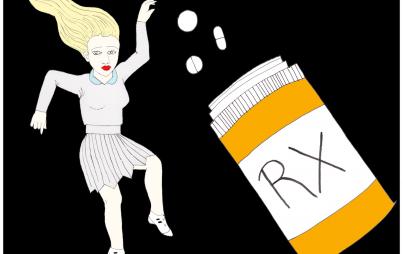
Thanksgiving ain't easy.
I know that this is kind of corny (HAHA — get it? corn?), but seriously, they call it Thanksgiving, and not Shamesgiving, for a reason: because it’s a day to consider all of the joy that you have in your life and to cultivate your gratitude toward it.
Last year, on Thanksgiving, I restricted my calorie intake.
When people are throwing roasted Brussels sprouts, garlic mashed potatoes, and cranberry stuffing in your face, that’s hard to do. Add (thanks, Italian roots) warm bakery bread with soft butter and heaps of penne alla marinara to that list, and it seems almost impossible.
But I did it, to the best of my abilities, because I was in a shitty place emotionally. And while I didn’t incur a full-on relapse during these dark times, I sure as hell went straight to my archnemesis as a coping mechanism: my eating disorder.
And if there’s one day of the year that it sucks to have an eating disorder, it’s definitely Thanksgiving.
And whether your eating disorder presents itself as restrictive, binging, or purging, I’m sure you agree. Heaps of delicious food alongside coaxing from family members to “mangia, mangia” (“eat up”) usually means a lot less gratitude than it does anxiety.
And while I’m a big proponent of teaching our loved ones how, during the holidays, to be gentle with our eating disorders (both in recovery and out), I also think it’s possible (and even necessary) to take matters into our own hands sometimes with a healthy dose of self-care.
Because eating disorder recovery is already hard enough (especially in this awful diet culture that we live in). It’s unfair that Thanksgiving comes around and makes it even harder.
So if you’re dreading it (aside from the casual annoyance of your family members), I’m here to help — or at least try – with three ways to nurture your eating disorder recovery during the most stressful meal of the year.
1. Have a Before, During, And After Self-Care Plan
Pro tip: Having a before, during, and after self-care plan does not look like planning on eating less leading up to and then following the big day. It also doesn’t look like promises to skimp on appetizers and desserts. This isn’t a day dedicated to guilt and shame, after all (more on that in point #3).
Having a self-care plan means being realistic about your expectations and your needs and preparing healthy coping strategies for managing your anxiety.
Personally, I’m a big proponent of having a long-term self-care plan that you practice consistently to help mange your ability to address the stresses of life when they come up. But even if you don’t have that set up, you can still practice short-term self care.
Leading up to Thanksgiving, take extra care of yourself. Journal more. Do more yoga. Score a massage appointment if you have the resources. Take more bubble baths. Do whatever the hell it is you need to do that makes you feel relaxed. That way, your energetic resources will be stocked back up in time for Tofurky Day (I’m vegetarian, OK?).
For the day itself, have a plan for how to pace yourself if binging is your issue. Have a plan for how to eat comfortably if restricting is your issue. Have a plan for how to take care of your negative emotions if purging is your issue. Take deep breaths at the dinner table when you’re feeling overwhelmed. Take every opportunity to talk to your cousin about her new master’s program (even if you don’t really give a shit) to occupy your wandering mind. And above all else: Wear. Stretchy. Pants. I’ve been contemplating for weeks now which pair of leggings I’ll be sporting.
And the day after? Take it easy. Know that it might be a bad body image day. Let it be a sweatpants-and-marathoning-your-favorite-TV-show kind of day. Remind yourself that you’re allowed to eat leftovers if you want to, but that you also don’t have to. Eat foods that make you feel happy and healthy — not foods that you deem as punishment. Move your body in ways that give you physical energy and spiritual joy — not ways that feel compensatory.
You made it.
2. Utilize Support Systems — Both Online And Off
I’m a big fan of support systems — maybe because I’d be nowhere without my own, which I frequently reassess to make sure that they’re meeting my needs. And if you’re in a place where you’re not quite sure who’s in your support system (or whether or not you need to add or subtract some people), it’s a good idea to create or improve upon yours far ahead of Thanksgiving so that you’re prepared.
One way to do this is to ask yourself, “Who makes me feel safe?” The folks in your go-to support systems should be ones who don’t cause you a lot of anxiety (so that old flame of yours that you have an on-again-off-again thing with probably isn’t the best choice). They should be folks who validate your experiences, acknowledge your efforts, and support your choices. I recommend having 3-5 of them in your mental arsenal. It’s important to have multiple people in your support system because we can’t expect any one or two people to hold all of our shit all the time, ya know?
Ask these folks if they might be able to be available to you during this rough time. Maybe they can be your emergency texting buddy during Thanksgiving dinner. Maybe they’ll come over to sweatpants-and-marathoning day on Friday. Maybe you just need someone to check up on you to see how you’re feeling. Let them know what you’re struggling with and what you need from them, and ask politely if they’re able to support you — fully aware that they might be too overwhelmed with their own stuff.
And if you’ve already got medical or mental health professionals in your support system (like, say, if you see a therapist regularly), then remember that they’re there for you, too!
And if you’re either in a pinch or wanting support a bit more anonymously, all day on Thanksgiving, you can follow and use the hashtag #THX4SUPPORT on Twitter to reach a group of activists and advocates who will coach you through the day.
You’re not alone in this.
3. Remember That This Is A Day About Giving Thanks — Including To Your Body
I know that this is kind of corny (HAHA — get it? Corn?), but seriously, they call it Thanksgiving, and not Shamesgiving, for a reason: because it’s a day to consider all of the joy that you have in your life and to cultivate your gratitude toward it.
When we spend so much time having an uncomfortable relationship with our bodies, though, it can be hard to try to put that aside — even for one day. Hell, even for one moment. But I think it’s at least worth a shot.
It’s silly, maybe, but something I really love doing is hearing what people are grateful for — not just on Thanksgiving, but any given day. But considering that’s the entire point of the holiday, it’s not out of the question to ask folks to share.
If you want, try persuading folks to go around the table, naming one thing about their body that they’re thankful for. Or maybe just break the mold and be the only one at the table who shares a detail like that. Or maybe you don’t want any of this to happen aloud, so instead, you write down for yourself what about your body you may not love, but surely appreciate. And maybe it’s not a long list. Maybe you can only come up with one thing. But that’s a start.
Because no matter how we feel about them, our bodies really do give us a lot. And it might be nice to acknowledge that and bow your head in gratitude. A tiny bit of reconciliation can go a long way.
There are a million reasons why Thanksgiving can be a difficult holiday for people. And for those of us with eating disorder histories, it can feel absolutely dreadful. But we’re going into this together. And we’re going to come out A-OK. I promise.








